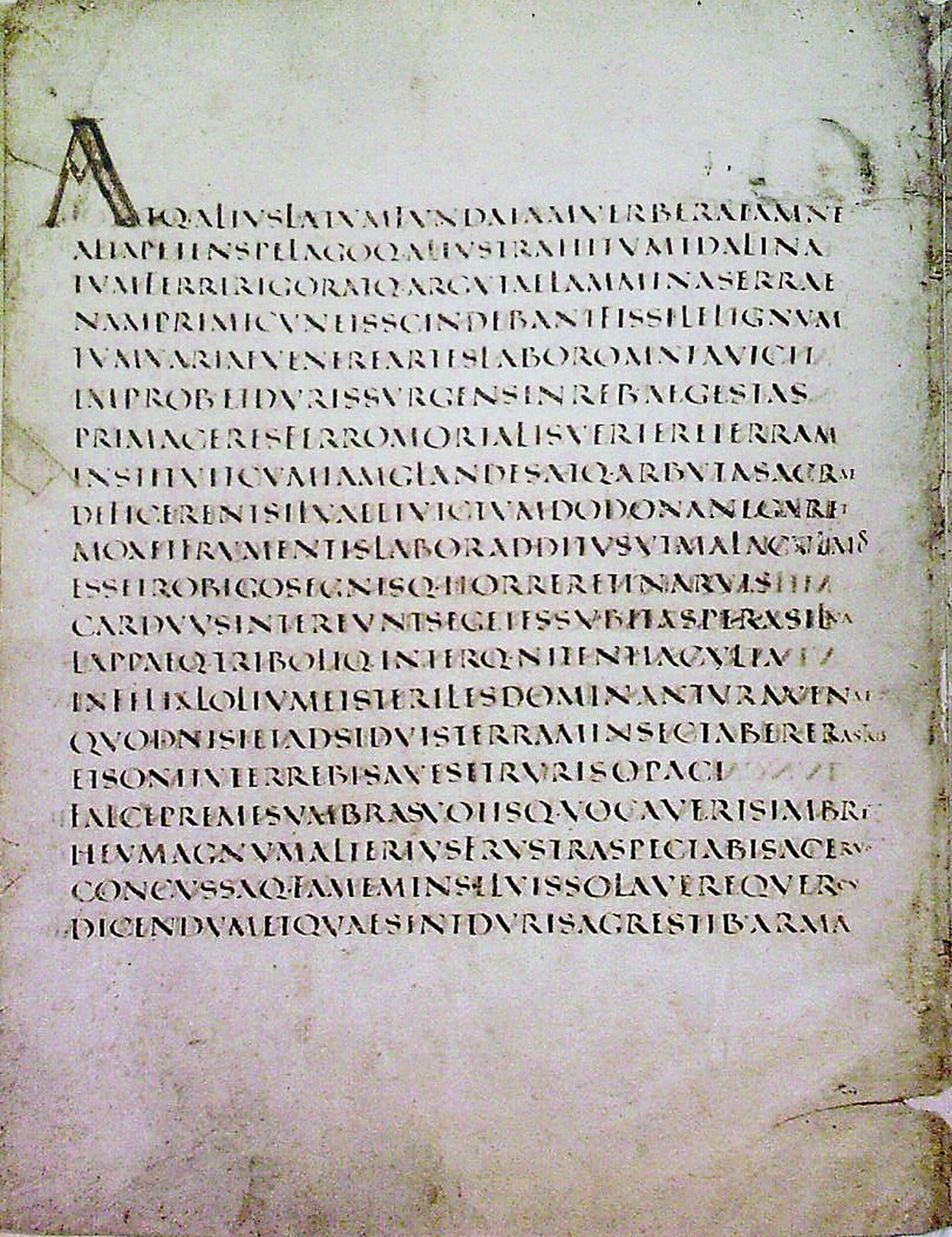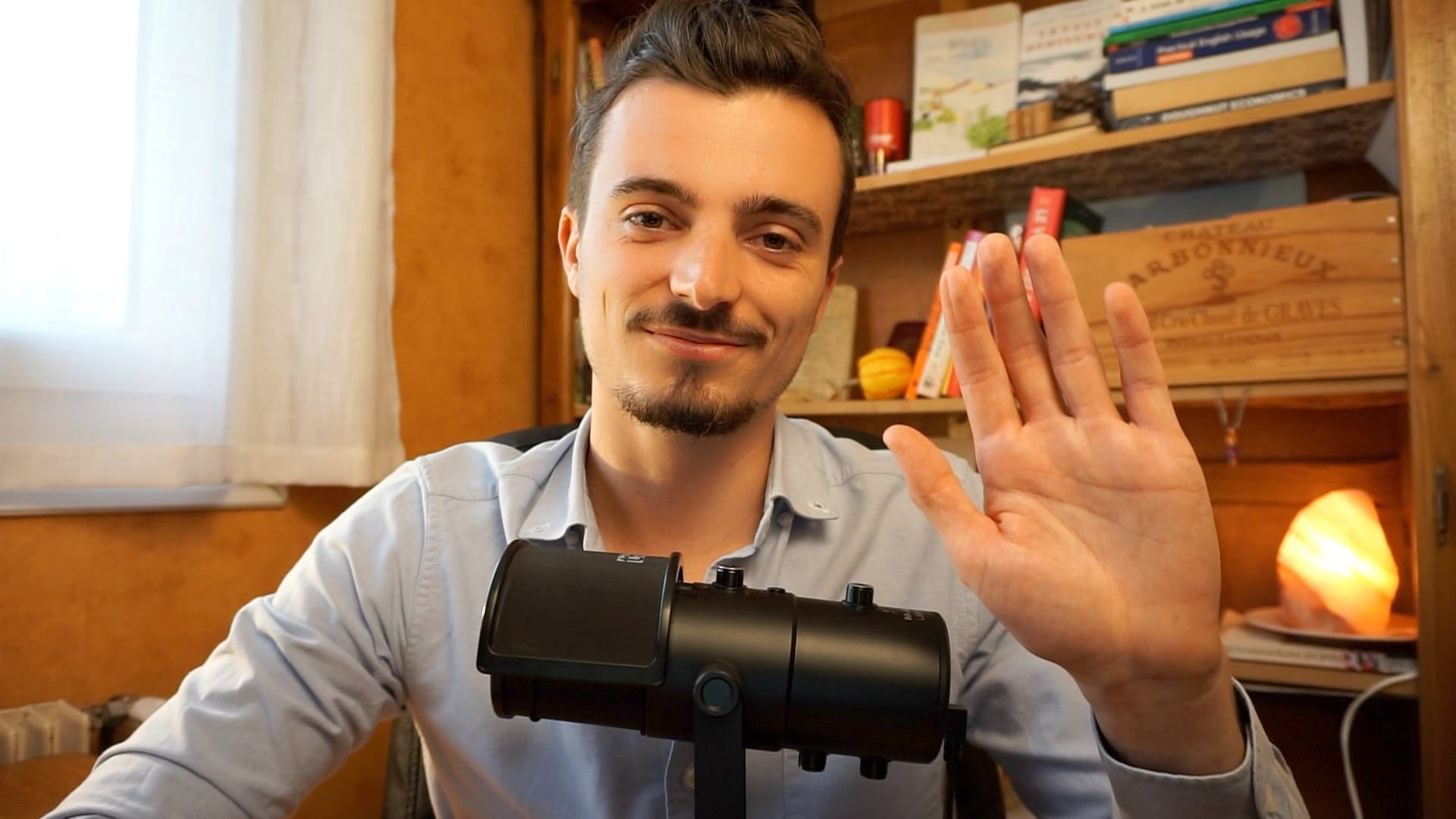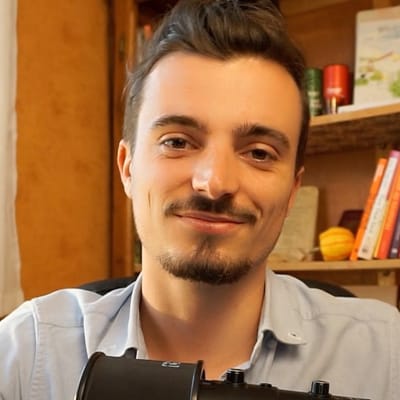🇫🇷👂French: Subtitles OFF - Lesson 002 (The 'Ne' goes on strike too)
Already read the intro? → Click to skip.
Yes, You Can Understand Spoken French
I know, right now it probably feels as doable as convincing a French train driver facing a pay cut to not go on strike.
Sentences sound like one long unbroken word...
French people don't stick to the English Conversation Speed Limit...
They often don't use the words you were taught and, when they do, they pronounce them completely differently...
But you shouldn't blame yourself — here's why:
Psst! If you want to go through the lesson with me, I've made a video (hand gestures included).
- Real spoken French and school French are almost two different languages, and most schools & apps only teach the latter (for some obscure reason). If your goal is to understand living, breathing French people, chances are you've been taught the wrong language.
- Most teaching methods are text-based, but conversations are pure sound. Even when apps include audio, they show you the spelling at the same time — so your brain naturally takes the easy route: it reads more than it listens, and your ears don't get nearly as much practice as you might think. Imagine learning to swim while clutching the pool's edge...
Let me bring this to life for you. Here are three eye-opening examples that'll make you wonder if French people are secretly pranking everyone:
1. Standard Spelling vs Honest Spelling
Did you know? Going on strike is such a central part of French culture that even French letters do it:
- What you see: "les oiseaux" (the birds)
- What you hear: lé-zwa-zo 🤪
That was textbook pronunciation, by the way. Real, everyday pronunciation goes one step further:
- Sentence: Je ne sais pas ce qu'il faisait ("I don't know what he was doing")
- What TV newscasters say: je-ne-sè-pa-se-kil-fe-zè (8 syllables)
- What your neighbours say: shè-pa-ski-vzè (4 syllables 😈)
Some of your neighbours may switch to "TV newscaster speak" when in front of a camera or when speaking to you only. But even TV newscasters drop this formal pronunciation the moment they're off air.
PS - Merci, mes parents, for those endless drives through Greece. Without that perfect blend of teenage boredom and a blank notebook, I might never have come up with 'Honest Spelling'.
2. Library French vs Living French
It's not just pronunciation. Here's how to say "What should Paul and I bring for the pre-dinner drinks?" in two languages 😉:
- Formal French: Que devons-nous amener pour l'apéritif, Paul et moi?
- Normal French: Paul et moi, on doit amener quoi pour l'apéro?
Here, because it's written, you can go back and forth and take time to think. But imagine hearing that phrase unexpectedly in a fast-moving conversation, when words disappear the second they were uttered...
3. Immaculate Fiction vs Messy Reality:
Finally, here's another way writing deceives us: those handy spaces between words? Pure fiction. They don't exist in speaking. Want proof? Read aloud the sentence below with a 1-sec pause between each word:
I. Am. A. Robot. From. An. Old. Science. Fiction. Movie. And. Listening. To. Your. Smoke. Detector's. Low. Battery. Beep. Is. More. Enjoyable.
No, listening to spoken French feels more like this:

That's the thing about spaces – they conveniently tell us where words start and finish. Without them, the only way to make out individual words in an uninterrupted flow of French sounds... is to know them by ear.
Don't cancel your plans in France just yet
Thanks to my secret learning technique that will make you fluent in just 30 days, you will...
Just kidding.
Fluency doesn't happen in thirty days. And there aren't any secrets. Only common sense:
- Learn the words we actually use.
- Train your ear on their real pronunciation.
Let's be clear: unlike some online programmes promising 'fun and easy' lessons, I won't sugarcoat it - this isn't easy. 'Easy' is like refined sugar - sweet and addictive, but empty calories.
Like my mum says, eat your veggies first. Walking to the market, picking the freshest ones, and turning them into a meal might not be easy... but you may actually find joy in the process.
And the long-term health benefits are worth it. When you understand real spoken French without subtitles, some remarkable things happen:
- Learning to speak gets a whole lot easier and more natural because your ear has internalised the patterns and grammar rules of the language. Instead of being stuck in your head computing complicated "subordinating conjunctions", you get that sixth sense that makes native speakers say, "I don't know why, but it just sounds right/wrong".
- You get to enjoy French films and shows, picking up cultural knowledge and references along the way... instead of risking to become, as intercultural communication expert Milton J. Bennett puts it, 'a fluent fool'.
- You feel more confident having interactions because you know you'll understand the reply
- You even get to understand group conversations and feel truly embedded in French life... instead of feeling like you're stuck in your own little bubble, disconnected from people.
In other words, you get to enjoy life with the locals, not just next to them.
And that is why I do what I do. To help you walk the path I walked when I moved to the UK and struggled to connect with people... but more smoothly, while avoiding the mistakes I made.
Follow my mum's advice. If you're anything like me, you'll be glad you did.
Why Learn Weather Phrases ☀️
You skipped the intro but still want to see me gesticulate while going through the lesson? I knew it. Here you go (intro skipped).
Instead of getting overwhelmed by rapid-fire French, let's start with something manageable and meaningful: weather phrases. They're ideal because they're:
- Practical: Commonly used in everyday life, so you learn useful words
- Social: Great icebreakers as they're about shared lived experiences and perfect for practising with neighbours since responses are predictable
- Blueprint: They use simple patterns that help your brain grasp the big picture, making future grammar and conjugation much easier to understand
- Real Pronunciation: They provide a smooth introduction to the most commonly-used pronunciation quirks and word shortenings that schools don't teach
- Fun: Weather phrases contain lots of colourful idioms that give insights into French culture, like "it's raining like a cow pissing" (and they say we speak the language of romance... 😂)
The Vanishing Act: How "Ne" Disappeared from Spoken French
This is the second lesson. In the first one, you learned what happened to the 'L' in "il". Following on the basics of real spoken French, we're going to see what happened to the most truant of all teacher pets: "ne".
This lesson is suitable for absolute beginners, and even advanced learners will learn new things that will help them understand broad patterns in real spoken French.
Picture this:
You're standing next to a log house, waiting for your vin chaud (mulled wine) in the buzzing atmosphere of your small-village Christmas market. The French person standing next to you glances over and says:
Honest Spelling: What you hear
🗣️👂brr-i-fé-pa-sho
Sounds vanish the second you hear them. Honest Spelling captures them on the fly and puts them on pause, giving you all the time you need to explore each part. It may look foreign at first, but it's exactly what your ears have to deal with. Try to identify words before clicking on the next section to reveal the spelling.
What we write
🔡📜 il ne fait pas chaud!
Sadly for us all, French Spelling loves playing hide-and-seek with sounds. Take a second to compare the ‘Honest Spelling’ with the actual spelling to connect the dots between what we write and the sounds we make:
- i-fé-pa-sho
- il ne fait pas chaud!
Then, make your best guess as to what these words mean, and click on the next section.
What it means
🇬🇧🇺🇸 the weather's not hot!
We have a saying in France that goes, "c'est en forgeant qu'on devient forgeron" (it's by forging that one becomes a blacksmith/forger). Indeed, the best way to get good at something... is to try doing that thing. Whether you got it right or not, you've just done that. Bravo.
That phrase is the perfect ice-melter 😉
- It points out something you probably have in common (feeling a little cold).
- It's not a direct question so it doesn't demand an answer beyond a nod, but it does open the door for more. In other words, it respects your choice to engage or not.
So, based on your overall attitude and body language when you respond, the other person will get a sense of whether or not you are open to conversation.
Unless you thought that ifépacho was a single word, a word you haven't yet learned. In which case you'd just nod, smile and look away awkwardly. I know, because I've done it. More times than I'd like.
That's in good part because I didn't learn language in the right order. The natural order. The order we learned our very first language: sounds first, text (much) later.
I don't want you to make the same mistake so this lesson mirrors the natural way your brain processes spoken French:
- Pure sounds come into your ears
- You map those sounds to French words you know
- You connect those words to meanings (initially through English words)
With practice, your brain becomes better at doing all these steps simultaneously and automatically. For now, we're walking through them carefully, but soon you'll find yourself doing exactly the same thing, just faster.
We have a problem, though.
There are tens of thousands of French words — memorising their pronunciation one by one would take longer than it took the "Immortals" of the Académie Française to write their latest dictionary (they started in 1986, finished last year). Do you really want to spend all that time like them, buried in textbooks?
That's why instead of just teaching isolated words, I'm going to break down the patterns behind French sounds. This will help you develop pattern recognition skills you can apply to many other French words — like having a few master keys that unlock entire neighbourhoods instead of needing one key for each individual house.

Beyond Text: Make Sense Of The Sounds 🗝️👂
Let's break down the pronunciation of "i-fé-pa-sho / il ne fait pas chaud", word by word.
But first, a quick aside.
Already familiar with some of these words from the previous lesson? Their sound breakdowns remain the same. Click here to skip directly to the new sound breakdowns.
👉 i-fé-pa-sho
- 🗣️👂 sho
- 🔡📜 chaud (hot/warm)
- 🤫🤦♀️ Letters On Strike: chaud - the "d" is silent when it's the very last letter of a French word (with only one exception: "sud" (south), and of course words of English origin, like "un iPad").
- 🔡❓Why we write it that way:
- sho - that sound usually comes from the letters "ch", but it sounds like the English "sh", with a soft start, like in "Chicago" (Ever wondered why nobody says "tchicago", like in normal English words with 'ch', like chit-chat or chick? →Because the city was founded and named by French speakers).
- sho - that sound usually comes from the letters "au" or "o". We couldn't decide which one looked prettier so we kept both 😉
👉 i-fé-pa-sho
- 🗣️👂 fé
- 🔡📜 fait (makes/does)
- 🤫🤦♀️ Letters On Strike: fait - The "T" is the most famous silent letter in French - it hasn't shown up to work in centuries. As such, we generally do not pronounce it when it's the very last letter of a French word (this excludes words of English origin, like Internet, kit, set...). There aren't many exceptions to this. The most useful ones are but, sept, huit, août, ouest, est and most words that end in -ct/-pt, like concept, direct, exact… These exceptions will stick naturally as you hear them used.
- 🔡❓Why we write it that way:
- fé - that sound can simply come from the letter "é", or when we feel fancy and want to add letters, it can come from the letter combination "ai".
- To be honest, the "ai" thing is a bit of a contentious topic.
- In the southern half of France (roughly), we keep it simple and pronounce "ai" exactly like "é", most of the time. Note: this is not a thick Southern accent, just a normal pronunciation in the South.
- In the northern half of France, they sometimes pronounce it like "é", sometimes like "è", and sometimes a mix of the two. Something about the cold must make their vowels shiver 😉
- That's a relatively modern pronunciation shift, so traditional phonetic transcriptions often miss that nuance.
- All in all, the difference between Southern and Northern pronunciations is small and shouldn't worry you as a learner. It's only there for certain Parisians to smugly declare their French the 'purest' (whatever that means 🤷).
- The é sound can also come from:
- Verbs ending in "-er" and "-ez" (manger, voulez...)
- One-syllable words ending in "-es" (les=lé, des=dé...)
- Longer words ending in "-et" (poulet, objet, bouquet...)
- The same earth-shattering North/South debate happens with "-et/-es". The sound difference is small and I want you to spend less time studying and more time in the sunshine, so I keep things simple and default to é. French is complicated enough as is.
- fé - that sound can simply come from the letter "é", or when we feel fancy and want to add letters, it can come from the letter combination "ai".
👉 i-fé-pa-sho
- 🗣️👂 i-fé
- 🔡📜 il fait (he/it makes/does)
- 🤫🤦♀️ Letters On Strike: il - Make sure no French speaker is looking over your shoulder, I'm about to reveal one of our dirty little secrets. We rarely -if ever- pronounce the L at the end of il when talking about the weather. Some French people enter a state of utter denial when I point this out ("Moi? How dare you!"), but lips don't lie - we even do it on TV, completely unwittingly of course. Because we don't listen to ourselves speak (why would we). We even do it in all sorts of other phrases with il, elle, and even ils and elles! But I digress - more on that in another lesson.
- 👄🔄 Pronunciation Variations:
- il-fé — so-called "proper" pronunciation. In the context of talking about the weather, most people never say it like that (that excludes medieval knights, wig-wearing noblemen, and poorly informed Americans).
- i-fé — the most common pronunciation.
- fé — sometimes we just can't be bothered and drop the il altogether. And sometimes we do pronounce the i... but we whisper it (a quintessentially French pronunciation quirk) so it sounds mostly like fé.
👉 i-fé-pa-sho
- 🗣️👂 pa
- 🔡📜 pas (not)
- 🤫🤦♀️ Letters On Strike: pas - we almost never pronounce the 's' when it's the last letter of a French word. There are very few exceptions to this (of which only 3 are common words: plus, fils, bus).

Beyond Rote: Make Sense Of The Words 🗝️📜
Did you know the French word for "understand"—comprendre—literally means "to take with you" (con-prendre)? As often, folk wisdom was onto something: to truly understand something, we need to connect it to what we already know—to take it with us into our existing mental landscape.
So let's give each French word a rich context—its cultural nuances, how it's actually used by real French people, its personality quirks and the little stories that make it stick in your memory without effort.
When a word has a story, it's no longer just a collection of sounds and letters—it's a quirky Michel you're happy to bump into again. So let's breathe life into these sounds by connecting them to meaning.
Already familiar with some of these words from the previous lesson? Their sound breakdowns remain the same. Click here to skip directly to the new word stories.
👉 il ne fait pas chaud
- chaud means hot/warm. We don't have separate words for 'hot' and 'warm' - we just say "très chaud" (very hot), "assez chaud" (quite hot)...
- 🤓 It has the same origin as the Spanish caliente! and the word calories (which you burn).
👉 il ne fait pas chaud
- il usually means he, but here it means it and it's impersonal - it doesn't represent a person. Instead, it represents the weather: it is hot = the weather is hot.
- il fait literally translates to "it makes", but here the meaning is different. Note: This is the phrase we use to talk about ambient temperature. We use a different phrase to talk about the temperature of an object:
- 🌡️ Ambient temperature: il fait chaud — literally "it makes hot". Think of it like "it makes me hot", because ambient temperature affects your whole body, while a cup of tea might only warm up your hand.
- ☕️ Objects: c'est chaud — literally "it's hot". Imagine you want to say that the weather is hot but you say "c'est chaud" instead... French people will look at your hands, wondering, "Where's that hot thing you're talking about?".
- 🌤️ Note: We also use the phrase il fait to talk about the weather in general (it's sunny, it's grey, it's muggy...) — except for rain, snow, hail... More on that in a future lesson.
👉 il ne fait pas chaud
- ne ... pas is the official way of saying isn't/doesn't/not. But in France, there are two worlds: l'Officiel and l'officieux (the unofficial). And like I said before, the French language that people speak every day, le français officieux, is practically a different language from le français Officiel.
- Indeed, in everyday French, most of the time, we do not say ne. We drop it altogether. Some French people will fight tooth and nail over this, insisting it's appalling and improper and sacrilegious. What's funny is it's usually just a matter of minutes before these same people inadvertently drop the ne themselves. One recent example from the comments section of one of my YouTube videos:

- The irony is perfect! In highlighting that I should say NE, she committed the unforgivable sin of omitting the written "ne" elsewhere: on avale pas les mots should be on n'avale pas les mots.
- So don't be derailed if someone tells you dropping the "ne" is barbaric. They probably don't pay attention to how they themselves speak, but zoom in on you because of your foreign accent. Pay attention to how they speak, not what they tell you.
Let's Recap 🧠💪
Remember, Active learning beats passive consumption. And you know what beats active learning? Active re-learning.
It's no coincidence that most words related to successful learning start with "re" (remember, recall, retrieve, reconnect... rappeler, retrouver, relier...). Each time you pause, recall, and re-connect the dots, you create deeper, more resilient memories. Your ears become more attuned, your comprehension more fluid. You transform fleeting sounds into lasting, physical neural pathways.
Ready? Let's reinforce some neurons!
Honest Spelling: What you hear
🗣️👂brr-i-fé-pa-sho
What we write
🔡📜 il ne fait pas chaud!
What it means
🇬🇧🇺🇸 the weather's not hot!
Et Voilà!
And there you have it – another glimpse into real, living French.
When you're ready to dive deeper, subscribe for the full lesson: six times the content you've just experienced, with over six new phrases and a lot more patterns and pronunciation insights to build a comprehensive toolkit for understanding real spoken French.
No pressure though. The free lessons will keep coming.
À bientôt !

Subscribe to continue reading
